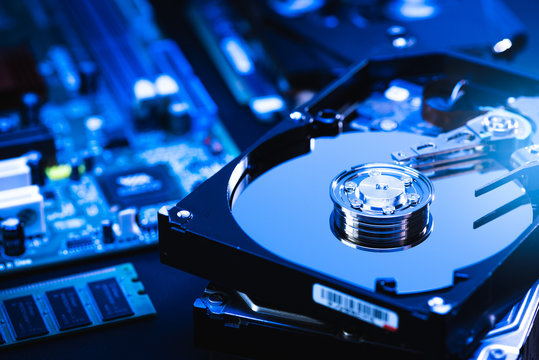Laptop hard drives are essential for storing all kinds of data, ranging from personal photos to critical business documents. Unfortunately, hard drive failures can happen anytime, leading to data loss and expensive repairs. To avoid such situations, choosing the right hard drive for laptop is vital. This blog provides valuable insights into selecting the perfect hard drive for laptop while avoiding costly data recovery fees. We will cover the following topics:
- How to Choose the Right Hard Drive for Laptop
- Tips for Maintaining and Protecting Your Laptop Hard Drive
- When to Consider Refurbished vs. New Hard Drives
- Understanding the Risks of DIY Data Recovery
- Common Mistakes to Avoid
- Choosing the Right Data Recovery Service
- how to create a backup plan to safeguard your data effectively.
How to Choose the Right Hard Drive for Laptop
When shopping for a laptop hard drive, there are several factors to consider, including size, type, speed, and brand. Let’s explore each factor below:
Size
The size of the hard drive refers to the amount of available storage space. The standard sizes range from 1TB to 4TB, although higher capacities are also available. Before purchasing a hard drive, evaluate your current and future storage needs carefully.
Type
There are two primary types of hard drives: Hard Disk Drives (HDD) and Solid State Drives (SSD). HDDs are traditional mechanical hard drives that rely on moving parts, making them less durable than SSDs. On the other hand, SSDs utilize flash memory technology, providing faster startups, quicker data access, and greater durability. Although SSDs tend to be more expensive than HDDs, they offer superior performance and reliability.
Speed
Hard drive speed is measured in revolutions per minute (RPM), indicating how quickly the drive can spin and retrieve data. Typical speeds for modern laptop hard drives include 5400 RPM and 7200 RPM. Faster speeds mean quicker load times and improved overall system responsiveness.
Brand
While many brands manufacture hard drive for laptop, some have built solid reputations for quality and reliability. Popular brands include Western Digital, Seagate, Samsung, Crucial, and Kingston. Stick with trusted names to minimize potential compatibility issues and maximize performance.
Tips for Maintaining and Protecting Hard Drive for Laptop
Preventative maintenance goes a long way toward preserving your laptop hard drive’s health and longevity. Here are some helpful tips for keeping your hard drive safe:
- Keep your laptop away from extreme temperatures and humidity levels
- Handle your laptop gently and avoid sudden drops or shocks
- Install and maintain updated antivirus software to protect against malware and viruses
- Periodically defragment your hard drive to optimize performance
- Schedule regular backups to safeguard important data
When to Consider Refurbished vs. New Hard Drive for Laptop
Refurbished hard drives often come at lower prices compared to new ones, making them attractive options for those on a tight budget. However, it would be best if you considered the following points before choosing for a refurbished model:
- Ensure the seller offers a warranty and return policy
- Check customer reviews to gauge product quality and reliability
- Verify that the hard drive has undergone thorough testing and inspection
Benefits Comparison Between Refurbished and New Hard Drive for Laptop
Deciding whether to buy a refurbished or new hard drive for laptop comes down to weighing the advantages and disadvantages of both options. Below is a summary of the key benefits of each option:
| Criteria | Refurbished | New |
| Price | Generally cheaper than new models | Higher initial investment |
| Quality | Tested, repaired, and certified by manufacturers or third parties | Fresh from the factory with original packaging |
| Reliability | Can match the reliability of new drives depending on the extent of reconditioning and QC processes followed | Often backed by manufacturer warranties and support |
| Environmental Impact | Reusing existing resources reduces waste and energy consumption | Manufacturing new products consumes raw materials and energy |
| Availability | May offer older or harder-to-find models | More likely to stock newer, modern technologies |
On the other hand, investing in a new hard drive guarantees maximum performance and peace of mind. Ultimately, the choice between a refurbished and new hard drive depends on individual preferences and financial constraints.
Understanding the Risks of DIY Data Recovery
Do-it-yourself (DIY) data recovery methods can sometimes yield positive results; however, attempting complex procedures without proper expertise poses significant risks. Some dangers associated with DIY data recovery include:
- Permanent data loss
- Further harm to the damaged hard drive
- Voided warranties
As such, entrusting experienced professionals with your precious data is advisable when dealing with severe hard drive issues.
Common Mistakes to Avoid
To increase your chances of successfully recovering lost data, steer clear of these common mistakes:
- Using unreliable or unproven data recovery tools
- Continuing to use the affected hard drive after detecting signs of trouble
- Ignoring warning signals like unusual sounds or sluggish behavior
Learn how to create a backup plan to safeguard your data effectively.
Establishing a strong backup strategy prevents data loss incidents caused by hard drive failures or accidental deletions. Follow these guidelines to craft a comprehensive plan:
- Identify Critical Data: Determine which files require protection, such as documents, media collections, application settings, and email correspondence.
- Select Storage Media: Utilize cloud storage platforms, external drives, or network attached storage (NAS) systems to house your backups. Ideally, employ multiple destinations for redundancy purposes.
- Implement Automated Processes: Configure scheduled backups within operating systems or via dedicated software to streamline the procedure.
- Perform Verification Tests: Validate the integrity of restored data periodically to confirm successful retrievals during emergencies.
- Monitor Progression: Track backup statuses consistently, addressing discrepancies promptly to mitigate possible complications.
Choosing the Right Data Recovery Service
Selecting the ideal data recovery service requires careful consideration of several factors:
- Go for established companies with proven track records of success
- Compare pricing structures among different providers to find affordable yet effective solutions
- Evaluate turnaround times based on urgency and deadlines
- Look for exceptional communication channels and technical support throughout the process
Conclusion
Picking the correct hard drive for laptop means looking at things like size, type, speed, and brand. Used or refurbished hard drives can be economical but make sure to pick a reputable supplier and assess product quality. New hard drives perform better but usually cost more. Be cautious about trying to rescue data yourself since experts are needed for serious cases. Creating a strong backup plan includes setting automatic processes, checking recovered data, and monitoring progress. Taking these factors into account assists you in deciding on the best storage solution, preventing huge headaches and steep recovery charges.
Also, for those who are interested in further laptop hard drive or are considering making a purchase, explore Direct Macro for the best information and market competitive prices.

